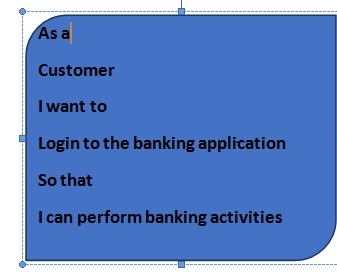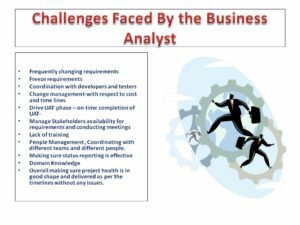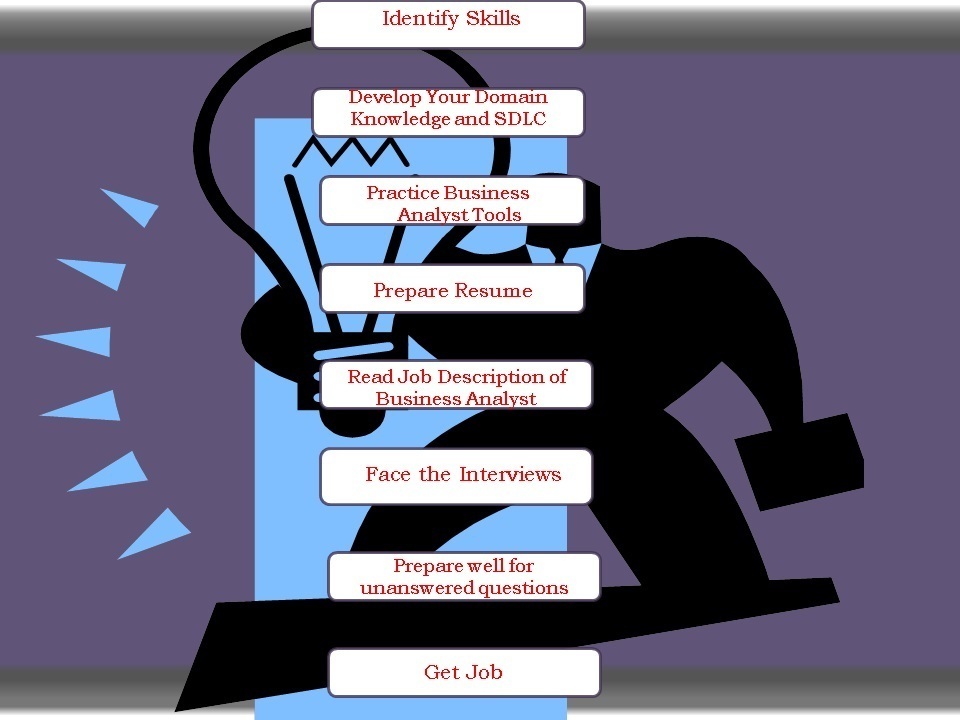Business Analyst Challenges
Here I am listing down the real time challenges faced by the Business Analyst. There can be other challenges but here I am mentioning few which are facing by the Business Analyst in day to day life. I believe it may enough when you are trying a fresher, one or two experience.
- Frequently changing requirements
- Freeze requirements
- Coordination with developers and testers
- Change management-with respect to cost and time lines
- Drive UAT phase – on time completion of UAT·
- Manage Stakeholders availability for requirements and conducting meetings
- Lack of training
- People Management , Coordinating with different teams and different people.
- Making sure status reporting is effective
- Domain Knowledge
- Overall making sure project health is in good shape and delivered as per the timelines without any issues.
 Changing Requirements:Client may change their requirements very frequently. As a Business Analyst it is Very difficult to manage internal and external stake holders when they are frequently changing the requirements. We can’t accept every change request because already we committed the deadline of the project and committed the timelines to client and higher management and it may impact on project cost also. And development team also started work for committed requirements.
Changing Requirements:Client may change their requirements very frequently. As a Business Analyst it is Very difficult to manage internal and external stake holders when they are frequently changing the requirements. We can’t accept every change request because already we committed the deadline of the project and committed the timelines to client and higher management and it may impact on project cost also. And development team also started work for committed requirements.
And it will take good amount of time to discuss and understand the requirement on the new change and feasibility of the same.
And we can’t say ‘No” to the client because it may impact on the project, so we need to convince client with proper reasons.
Before saying “Yes” or “No” as a Business Analyst we need to analyze what is the impact of this change and how much effort needed to deliver this change.
Every client may not change their requirements frequently but it may happen in general.
Freeze Requirements:
We need not to consider this as a tough challenge but sometimes client may make you struggle to give sign off and sometimes client will delay on providing the sign off. Because of this development may delay, and we can inform the same to client during the meetings.
This is not a tough challenge but for some reasons, client will not sign-off on the requirements or delay sign-off. The reason is, once client provide sign-off on the requirements, any changes will be charged additionally. So client will take some time to sign-off but this will again impact our project schedule.
However in real time, we start follow-up with client to get sign-off and we will commit the delivery dates once we get sign off from the client only. Unless we get signoff from the client on FSD we will not start work on this project. It will happen rarely but there is a chance to take place this scenario.
Challenges during Development:
This is also a common challenge for business analyst across organizations.
Developers will understand in a different way and do coding but when it comes to testing, testers might have understood in a different way and they will raise as a defect (bug) on developers. Developers will not easily accept the bug because they developed it and it will impact on their performance. Testers will argue it as a bug and finally it will be parked over Business Analyst. How to avoid these situations? Usually Business Analysts will share SRS / FSD containing requirements with developers and testers but Business Analyst should make sure that joint sessions to be organized with development team and testing team. Business Analyst should explain the requirements in joint session to both developers and testers and give them some time to read and understand. In case of any doubts Business Analyst should clarify then and there to avoid further confusions. And Business Analyst needs to conduct meeting with the internal stake holders frequently to get the project updates and to get to know whether team is facing any issues during development.
Change Management:
As we discussed previously once requirements are signed-off from client, any changes to the requirements will have impact on cost and schedule. So change management needs to be involved. i.e client should agree to provide more cost and additional time to deliver.
Most of the time, clients will not easily agree to the additional cost and time. This will require some sessions to convince clients. This will consume some effort.
However this is not exactly a challenge of Business Analyst, it will be project manager who will coordinate with customer for additional cost and time but since requirements are involved Business Analyst will also be engaged in change management process.
Challenges faced by the Business Analyst during UAT (User Acceptance Testing):
Once development and system testing is done from project execution team & before taking software / application go live, UAT has to be done. In the project execution your project Manager will reserve some time exclusively for UAT. In real time clients will not start UAT in time. So, any delay in UAT will have impact on project roll-out. So Business Analyst should drive UAT and make sure clients start testing from their end in-time. In case of any defects in UAT phase Business Analyst should quickly resolve with help of developers and testers. And if these are related to application functionality then business analyst needs to address it as soon as possible.
Again, just like getting sign-off on requirement documents, Business Analyst should get a sign-off on UAT as well. Client should confirm that UAT is performed and no pending issues.
Sample BA Document Templates
FREE DOWNLOAD |
Manage Stakeholders Availability for requirements:
Requirements’ gathering is most important phase in the SDLC. Business Analyst will arrange sessions with clients to understand the requirements. Most of the times Business Analyst will need business units, tech teams, Architects & other stakeholders to discuss about the problem statement and collect end customer needs but not everyone will be available at the same time.
Especially if company is into consulting, tech teams will be working on multiple projects. You need to match client’s time with every stakeholder which seems easy but really challenging.
If meetings get delayed, project plan will be affected and hence delivery/implementation date gets postponed, your client will not agree and difficult to convince.
Lack of training :
Sometimes you may face the client without proper training, as you do not have enough knowledge and enough training on product, you can’t convince the client and you can’t provide suitable solutions to client. Due to this client may lose confidence and trust on you. If you want to prove as a good business analyst it is very important to maintain good relationship with all the stake holders to things get it done smoothly.
Lack of Domain Knowledge
Domain knowledge is very important for business Analyst, so that business analyst can understand what client is trying to explain and what exact requirement of the client is. It will help us to explain the functionality to developers and internal stakeholders.
I hope it helped you to provide overview on Business Analyst Challenges
To know more about Business Analyst Challenges, you can browse on google.
Sample BA Document Templates
FREE DOWNLOAD |
Business Analyst Challenges: FAQs
What are the challenges faced by business analyst?
Getting Stakeholders To Make Time.
Lack of Clarity.
Inadequate Time Allotted For BA Work.
Conflict Among Stakeholders.
What does a business analyst do?
The analyst is involved in the design or modification of business systems or IT systems. The analyst interacts with the business stakeholders and subject matter experts in order to understand their problems and needs. The analyst gathers, documents, and analyzes business needs and requirements
What is the role of business analyst in SDLC?
Role of Business Analyst during SDLC Process
Then leads in analysis and designing phase, dictates in code development, then follows the testing phase during bug fixing as a change agent in the project team and ultimately fulfills the customer requirements
What are the qualities of a good business analyst?
Impressive Communication. Imagine hiring a business analyst who mumbles every time they speak. …
The Ability To Solve Problems. A problem occurs within the company. …
Critical Thinking. Finding the ideal solution doesn’t “just happen.” …
An Analytical Mind. You don’t have to be born with it. …
Process Modeling Knowledge
What does a BA do in Agile?
The AGILE BA defines improvements to business processes, assists decision-makers in gathering information to make decisions, helps quality assurance test solutions and products, designs user interfaces and even steps in as a product owner, scrum master, or project manager as the occasion calls for.
Business Analyst , Functional Consultant, Provide Training on Business Analysis and SDLC Methodologies.












